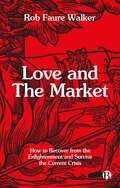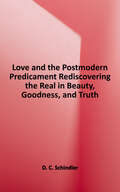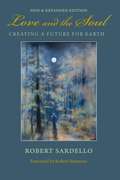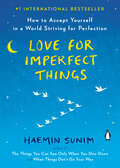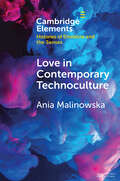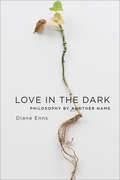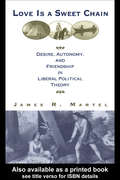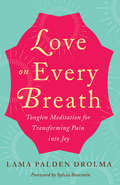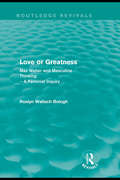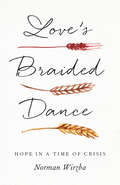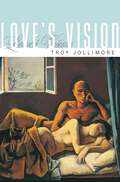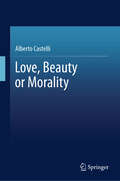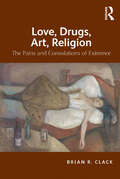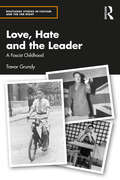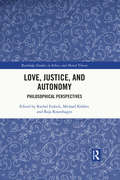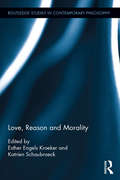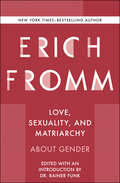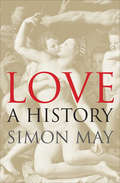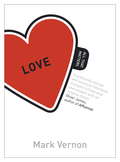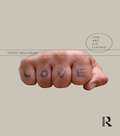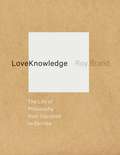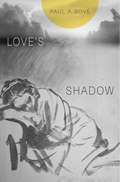- Table View
- List View
Love and the Market: How to Recover from the Enlightenment and Survive the Current Crisis
by Rob Faure WalkerLove is fundamental to the flourishing of society and nature. However, the competition of the market economy has resulted in a fractured and traumatized modern world. Revisiting philosophical developments and countercultures since the Enlightenment, this book offers a ‘loving critique’. It shows how learning to love better is the key to releasing ourselves from the alienating grip of the market. The utopian template presented draws on archaeology, the witch trials, hippies, Hinduism, Buddhism, quantum mechanics and psychedelics to describe how we can build a more loving society that can survive and flourish through the ecological, ethical, economic and existential crises that we all now face.
Love and the Postmodern Predicament: Rediscovering the Real in Beauty, Goodness, and Truth (Veritas)
by D. C. SchindlerThe computer has increasingly become the principal model for the mind, which means our most basic experience of "reality" is mediated through a screen, or stored in a cloud. As a result, we are losing a sense of the concrete and imposing presence of the real, and the fundamental claim it makes on us, a claim that Iris Murdoch once described as the essence of love. In response to this postmodern predicament, the present book aims to draw on the classical philosophical tradition in order to articulate a robust philosophical anthropology, and a new appreciation of the importance of the "transcendental properties" of being: beauty, goodness, and truth. <p><p>The book begins with a reflection on the importance of metaphysics in our contemporary setting, and then presents the human person's relation to the world under the signs of the transcendentals: beauty is the gracious invitation into reality, goodness is the self-gift of freedom in response to this invitation, and truth is the consummation of our relation to the real in knowledge. The book culminates in an argument for why love is ultimately a matter of being, and why metaphysical reason is indispensable in faith.
Love and the Soul: Creating a Future for Earth
by Robert SardelloWith economies in peril, war in the Middle East, genocides, global warming, and a host of other grim phenomena, the world has never seemed so besieged. The solution, says Robert Sardello, lies with the individual. In this timely, thoughtful book, he explains how the soul can engage with the outer world to produce radical change. Because we think of the world as a vast mechanism and behave as mechanical objects in it, the results are devastation and dysfunction. The key is to learn to identify with the plight of the Earth by developing a true sense of individual imagination and conscious awareness of inner purpose and beauty in conjunction with the soul of the world. Sardello shows how to achieve this awareness and bring what is inside out into the world, inspiring balance and stability. Using the Grail legend and the myth of Sophia--known as the Soul of the World--as well as writings by Jung, James Hillman, and Rudolf Steiner,Love and the Soulhelps readers imagine a revitalized Earth by exploring the significance of grieving, the transformative power of radical receptivity, the creative power of dreaming, and a new basis for community.
Love for Imperfect Things: How to Accept Yourself in a World Striving for Perfection
by Haemin Sunim Lisk FengSusan Cain, New York Times bestselling author of Quiet: "The world could surely use a little more love, a little more compassion, and a little more wisdom. In Love for Imperfect Things, Haemin Sunim shows us how to cultivate all three, and to find beauty in the most imperfect of things--including your very own self."A #1 internationally bestselling book of spiritual wisdom about learning to love ourselves, with all our imperfections, by the Buddhist author of The Things You Can See Only When You Slow DownHearing the words "be good to yourself first, then to others" was like being struck by lightning.Many of us respond to the pressures of life by turning inward and ignoring problems, sometimes resulting in anxiety or depression. Others react by working harder at the office, at school, or at home, hoping that this will make ourselves and the people we love happier. But what if being yourself is enough? Just as we are advised on airplanes to take our own oxygen first before helping others, we must first be at peace with ourselves before we can be at peace with the world around us.In this beautiful follow-up to his international bestseller The Things You Can See Only When You Slow Down, Zen Buddhist monk Haemin Sunim turns his trademark wisdom to the art of self-care, arguing that only by accepting yourself--and the flaws that make you who you are--can you have compassionate and fulfilling relationships with your partner, your family, and your friends. With more than thirty-five full-color illustrations, Love for Imperfect Things will appeal to both your eyes and your heart, and help you learn to love yourself, your life, and everyone in it.When you care for yourself first, the world begins to find you worthy of care.
Love in Contemporary Technoculture (Elements in Histories of Emotions and the Senses)
by Ania MalinowskaThis Element outlines the environments of loving in contemporary technoculture and explains the changes in the manner of feelings (including the experience of senses, spaces, and temporalities) in technologically mediated relationships. Synchronic and retrospective in its approach, this Element defines affection (romance, companionship, intimacy etc.) in the reality marked by the material and affective 'intangibility' that has emerged from the rise of digitalism and technological advancement. Analysing the (re)constructions of intimacy, it describes our sensual and somatic experiences in conditions where the human body, believed to be extending itself by means of the media and technological devices, is in fact the extension of the media and their technologies. It is a study that outlines shifts and continuums in the 'practices of togetherness' and which critically rereads late modern paradigms of emotional and affective experiences, filling a gap in the existing critical approaches to technological and technologized love.
Love in the Dark: Philosophy by Another Name
by Diane EnnsIntimate love opens us up to suffering, sacrifice, and loss. Is it always worth the risk? Consulting philosophers, writers, and poets who draw insights from material life, Diane Enns shines a light on the limits of erotic love, exploring its paradoxes through personal and philosophical reflections. Situating experience at the center of her inquiry, Enns conducts philosophy "by another name," elaborating the ambiguities and risks of love with visceral clarity.Love in the Dark claims that intimacy must accept risk as long as love does not destroy the self. Erotic love inspires an inexplicable affirmation of another but can erode autonomy and vulnerability. There is a limit to love, and appreciating it requires a rethinking of love's liberal paradigms, which Enns traces back to the hostility toward the body and eros in Christianity and the Western philosophical tradition. Against a legacy of an abstract and sanitized love, Enns recasts erotic attachment as an event linked to conditional circumstances. The value of love lies in its intensity and depth, and its end does not negate love's truth or significance. Writing in a lyrical, genre-defying style, Enns delineates the paradoxes of love in its relations to lust, abuse, suffering, and grief to reach an account faithful to human experience.
Love is a Sweet Chain: Desire, Autonomy and Friendship in Liberal Political Theory
by James MartelNotions of love intersect with ideas on personal liberty, obligation, individuality, self, and difference in this study. James Martel contends that theorists' inattention to the subject has impoverished our explorations of political discourse.
Love on Every Breath: Tonglen Meditation for Transforming Pain into Joy
by Lama Palden DrolmaToday, when our human family is facing so many challenges, it is more important than ever that we find peace and sustenance in our hearts. Love on Every Breath, or Tonglen, is an eight-step meditation for anyone who wants to nourish and open their heart. An ancient and profound meditation that has been practiced in isolated mountain retreats in the Himalayas for centuries, it is now available to us in the modern world. Lama Palden Drolma, a Western teacher trained by Tibetan Buddhist masters and also schooled in contemporary psychotherapy, introduces readers to the meditation in this powerful, user-friendly book. She walks readers step-by-step through the meditation, from beginning issues of sitting with awareness and focusing on the breath to taking in and extending love. Real-life challenges of sadness, anger, and overwhelm are addressed with &“On-the-Spot&” versions of the meditation. Love on Every Breath is a meditation that changes our experience in the moment — and changes our lives.
Love or greatness: Max Weber and masculine thinking (Routledge Revivals)
by Roslyn Wallach BologhThis work, first published in 1990, reissues the first thorough examination of the essentially masculine nature of Max Weber's social and political thinking. Through a detailed examination of his central texts, the author demonstrates Weber's masculine reading of 'social life' and shows how his work advocates a masculine form of life that poses a challenge to contemporary women and to feminism. In particular, she addresses the patriarchal implications of Weber's belief in the need to relegate the ethic of brotherly love to a private sphere in order to make possible rational action and the achievement of greatness in the public sphere.
Love's Braided Dance: Hope in a Time of Crisis
by Norman WirzbaA moving exploration of the place of hope in the world today, drawing on agrarian principles In this series of meditations, Norman Wirzba recasts hope not as something people have, like a vaccine to prevent pain and trouble, but as something people do. Hope evaporates in conditions of abandonment and abuse. It grows in contexts of nurture and belonging. Hope ignites when people join in what Wendell Berry calls &“love&’s braided dance&”—a commitment to care for one another and our world. Through personal narratives and historical examples, Wirzba explores what sustains hope and why it so often seems absent from our vision of the future. The vitality of hope, he maintains, depends on a collective commitment to care for the physical world (its soils and waters, plants and animals, homes and neighborhoods) and to promote the moral, aesthetic, and spiritual ideals that affirm life as good, beautiful, and sacred. Engaging with such contemporary topics as climate change, AI and social media, and the intensifying refugee crises and drawing on the wisdom of James Baldwin, Archbishop Desmond Tutu, Robin Wall Kimmerer, Martha Graham, and others, Wirzba offers a powerful argument for hope as a way of life in which people are intimately and practically joined with all the living.
Love's Enlightenment: Rethinking Charity in Modernity
by Ryan Patrick HanleyA number of prominent moral philosophers and political theorists have recently called for a recovery of love. But what do we mean when we speak of love today? Love's Enlightenment examines four key conceptions of other-directedness that transformed the meaning of love and helped to shape the way we understand love today: Hume's theory of humanity, Rousseau's theory of pity, Smith's theory of sympathy, and Kant's theory of love. It argues that these four Enlightenment theories are united by a shared effort to develop a moral psychology that can provide both justificatory and motivational grounds for concern for others in the absence of recourse to theological or transcendental categories. In this sense, each theory represents an effort to redefine the love of others that used to be known as caritas or agape - a redefinition that came with benefits and costs that have yet to be fully appreciated.
Love's Vision
by Troy JollimoreLove often seems uncontrollable and irrational, but we just as frequently appear to have reasons for loving the people we do. In Love's Vision, Troy Jollimore offers a new way of understanding love that accommodates both of these facts, arguing that love is guided by reason even as it resists and sometimes eludes rationality. At the same time, he reconsiders love's moral status, acknowledging its moral dangers while arguing that it is, at heart, a moral phenomenon--an emotion that demands empathy and calls us away from excessive self-concern. Love is revealed as neither wholly moral nor deeply immoral, neither purely rational nor profoundly irrational. Rather, as Diotima says in Plato's Symposium, love is "something in between." Jollimore makes his case by proposing a "vision" view of love, according to which loving is a way of seeing that involves bestowing charitable attention on a loved one. This view recognizes the truth in the cliché "love is blind," but holds that love's blindness does not undermine the idea that love is guided by reason. Reasons play an important role in love even if they rest on facts that are not themselves rationally justifiable. Filled with illuminating examples from literature, Love's Vision is an original examination of a subject of vital philosophical and human concern.
Love, Beauty or Morality
by Alberto CastelliThis book is moved by two main questions. Is Love a matter of beauty or mortality? In other words, is love an ethical ideal? Also, modernity understood as the age of mechanical reproduction, has shaped not simply our cities but our very same way of feeling. How has our conception of love changed, if it has, in the past two centuries? This book is to address these questions. It is not to trace the evolution of the idea of love in Western culture, from Plato to the present day. It aims to bring to the surface different shades of love lingering at the heart of Western culture to rehabilitate the myth of love to its original credibility. Our confused civilization has split love into sensual and moral aspects but to be aware of it is perhaps to defeat a dilemma that seems so unnatural. This book is about how we make sense of our lives through love and how nineteenth and twentieth-century literature records it.
Love, Drugs, Art, Religion: The Pains and Consolations of Existence
by Brian R. ClackIn this original and far-reaching contribution to the philosophy of religion, Brian R. Clack examines the manner in which religious belief emerges from the turbulence and anxiety of human existence. Taking his cue from Freud's suggestion that human life is so hard to bear that it requires nothing short of cultural and psychological palliative care, Clack explores each of the 'palliative measures' Freud catalogues - intoxicants, religion, art and love - and evaluates their role in the mitigation of suffering and the provision of the assistance required for an endurable life. This examination provides the context for an investigation into the meaning and function of religious belief when considered as a palliative. Clack initially subjects religion to ferocious critique, defending the psychoanalytic judgment that religious beliefs operate as wish-fulfilling illusions, but then elaborates a revised understanding of religion, one in which comforting illusions are banished and in which religious belief faces up to reality and reconciles us both to the pains and disappointments of existence and to our nullity and inevitable annihilation. in this genuinely interdisciplinary work, Clack breaks new ground by using detailed explorations of the phenomena of drug-use, romantic love and the enjoyment of art in order to throw light on the meaning and nature of religion. This book will be vital reading for anyone concerned with the fundamental questions of religious belief, the psychoanalytic approach to culture, or simply the unavoidable existential problems lying at the very heart of human life.
Love, Hate and the Leader: A Fascist Childhood (Routledge Studies in Fascism and the Far Right)
by Trevor GrundyLove, Hate and the Leader is a memoir of growing up in a Fascist family in post-war Britain. For Trevor Grundy and his family, Fascist leader Oswald Mosley was a God and antisemitism was a creed. His father was a Fascist brawler, his mother obsessed with Mosley and Grundy himself dreamed Mosley was his father and grew up to be the youngest member of the Fascist Union Movement to speak at Trafalgar Square. But, after her death, Grundy learnt that his mother was Jewish. The book features additional material from its original 1998 edition with more detail on Fascist figures in Grundy's childhood as well as his life after leaving the Fascist movement. This book will appeal to those interested in British Fascism, far-right history and family memoirs.
Love, Justice, and Autonomy: Philosophical Perspectives (Routledge Studies in Ethics and Moral Theory)
by Michael Kühler Rachel Fedock Raja RosenhagenPhilosophers have long been interested in love and its general role in morality. This volume focuses on and explores the complex relation between love and justice as it appears within loving relationships, between lovers and their wider social context, and the broader political realm. Special attention is paid to the ensuing challenge of understanding and respecting the lovers’ personal autonomy in all three contexts. Accordingly, the essays in this volume are divided into three thematic sections. Section I aims at shedding further light on conceptual and practical issues concerning the compatibility or incompatibility of love and justice within relationships of love. For example, are loving relations inherently unjust? Might love require justice? Or do love and justice belong to distinct moral domains? The essays in Section II consider the relation between the lovers on the one hand and their broader societal environment on the other. Specifically, how exactly are love and impartiality related? Are they compatible or not? Is it unjust to favor one’s beloved? Finally, Section III looks at the political dimensions of love and justice. How, for instance, do various accounts of love inform how we are to relate to our fellow citizens? If love is taken to play an important role in fostering or hindering the development of personal autonomy, what are the political implications that need to be addressed, and how? In addressing these questions, this book engenders a better understanding both of conceptual and practical issues regarding the relation between love, justice, and autonomy as well as their broader societal and political implications. It will be of interest to advanced students and scholars working on the philosophy of love from ethical, political, and psychological angles.
Love, Reason and Morality (Routledge Studies in Ethics and Moral Theory)
by Katrien Schaubroeck Esther KroekerThis book brings together new essays that explore the connection between love and reasons. The observation that considerations of love carry significant weight in the deliberative process opens up new perspectives in the classic discussion about practical reasons, and gives rise to many interesting questions about the nature of love’s reasons, about their source and legitimacy, about their relation to moral and epistemic reasons, and about the extent to which love is sensitive to reasons. The contributors to this volume orient questions related to love within the broader context of the contemporary discussion on practical reasons, and move forward the conversation about the normative dimensions of love. Love, Reason and Morality will be of interest to philosophers working on issues of normativity, meta-ethics and moral psychology, and especially those interested in the source of practical reasons and the role of attachments in practical deliberation.
Love, Sexuality, and Matriarchy: About Gender
by Erich Fromm&“[A] fascinating collection of essays&” on the complicated relations between men and women from the New York Times–bestselling author of The Art of Loving (The New York Times Book Review). The renowned social psychologist delves deep into the fraught relationship between genders, drawing upon the influential insights of Bachofen, Freud, Marx, and Briffault. Not primarily interested in the existence of anatomical and biological differences between the sexes, Fromm instead analyzes how these differences have been made use of throughout human history. Drawing from Bachofen&’s Mother Right, Fromm expounds on how matriarchal and patriarchal social structures determine relations between the sexes in essential ways, and how they are shaped by the dominant orientation of the social character at any given time. He posits that the most important question concerning gender relations is which characterological orientation determines human relationships: love or hate, love of life or fascination with force. Thus, it will not be gender conflict that will determine humanity&’s future but whether we opt for love of life or love of death. &“As these essays show, Fromm was a wide-ranging thinker whose writings sometimes manifested brilliant insights or practical wisdom.&” —Kirkus Reviews
Love: A History
by Simon May&“What is love? May plunders Western poetry, philosophy and psychology to find answers . . . Thought-provoking stuff&” (The Sunday Telegraph). Love—unconditional, selfless, unchanging, sincere, and totally accepting—is worshipped today as the West&’s only universal religion. To challenge it is one of our few remaining taboos. In this path-breaking and superbly written book, philosopher Simon May does just that, dissecting our ideas of love and showing how they are the product of a long and powerful cultural heritage. Tracing over twenty-five hundred years of human thought and history, May shows how our idea of love developed from its Hebraic and Greek origins alongside Christianity until, during the last two centuries, &“God is love&” became &“love is God&”—so hubristic, so escapist, so untruthful to the real nature of love, that it has booby-trapped relationships everywhere with deluded expectations. Brilliantly, May explores the very different philosophers and writers, both skeptics and believers, who dared to think differently: from Aristotle&’s perfect friendship and Ovid&’s celebration of sex and &“the chase,&” to Rousseau&’s personal authenticity, Nietzsche&’s affirmation, Freud&’s concepts of loss and mourning, and boredom in Proust. Against our belief that love is an all-powerful solution to finding meaning, security, and happiness in life, May reveals with great clarity what love actually is—and what it means. &“The most persuasive account of love&’s nature I have ever read.&” —Financial Times &“Intellectually engaging . . . Provocative.&” —The Wall Street Journal
Love: All That Matters
by Mark VernonLove: All That Matters argues that the modern view on love has been distorted by a fixation on romantic love that has depleted our resources for living through the darker sides of love, whereas in fact there are several ways in which humans give and experience love over the course of their lives and it is best to have access to them all.Vernon draws on science, psychology, philosophy and literature, to examine eight different kinds of love, each associated with a phase of human development. From infant narcissism and the emergence of eros, through puberty and the rush of romantic love, to the end of life and the love of God, this is a beguiling tour of the most mysterious force of all.This accessible and readable book will appeal to both students and general readers, giving a fascinating introduction to the psychology and philosophy of love - and what matters most about it.
Love: All That Matters (All That Matters)
by Mark VernonLove: All That Matters argues that the modern view on love has been distorted by a fixation on romantic love that has depleted our resources for living through the darker sides of love, whereas in fact there are several ways in which humans give and experience love over the course of their lives and it is best to have access to them all.Vernon draws on science, psychology, philosophy and literature, to examine eight different kinds of love, each associated with a phase of human development. From infant narcissism and the emergence of eros, through puberty and the rush of romantic love, to the end of life and the love of God, this is a beguiling tour of the most mysterious force of all.This accessible and readable book will appeal to both students and general readers, giving a fascinating introduction to the psychology and philosophy of love - and what matters most about it.
Love: What Can We Care For? (The Art of Living)
by Tony MilliganWhat is love? What is it to be loved? Can we trust love? Is it overrated? These are just some of the questions Tony Milligan pursues in his novel exploration of a subject that has occupied philosophers since the time of Plato. Tackling the mood of pessimism about the nature of love that reaches back through Schopenhauer and Kierkegaard, he examines the links between love and grief, love and nature, and between love of others and loving oneself. We love too few things in the world, Milligan concludes, adding that we need to be loved too, to appreciate our own value and the worth of life itself.
LoveKnowledge: The Life of Philosophy from Socrates to Derrida
by Professor Roy BrandSince its inception, philosophy has struggled to perfect individual understanding through discussion and dialogue based in personal, poetic, or dramatic investigation. The positions of such philosophers as Socrates, Spinoza, Rousseau, Nietzsche, Foucault, and Derrida differ in almost every respect, yet these thinkers all share a common method of practicing philosophy—not as a detached, intellectual discipline, but as a worldly art. What is the love that turns into knowledge and how is the knowledge we seek already a form of love? Reading key texts from Socrates to Derrida, this book addresses the fundamental tension between love and knowledge that informs the history of Western philosophy. LoveKnowledge returns to the long tradition of philosophy as an exercise not only of the mind but also of the soul, asking whether philosophy can shape and inform our lives and communities.
Love’s Shadow
by Paul A. BovéA case for literary critics and other humanists to stop wallowing in their aestheticized helplessness and instead turn to poetry, comedy, and love.Literary criticism is an agent of despair, and its poster child is Walter Benjamin. Critics have spent decades stewing in his melancholy. What if instead we dared to love poetry? To choose comedy over Hamlet’s tragedy, romance over Benjamin’s suicide on the edge of France, of Europe, of civilization?Paul Bové challenges young lit critters to throw away their shades and let the sun shine in. Love’s Shadow is his three-step manifesto for a new literary criticism that risks sentimentality and melodrama and eschews self-consciousness. The first step is to choose poetry. There has been since the time of Plato a battle between philosophy and poetry. Philosophy has championed misogyny, while poetry has championed women, like Shakespeare’s Rosalind. Philosophy is ever so stringent; try instead the sober cheerfulness of Wallace Stevens. Bové’s second step is to choose the essay. He praises Benjamin’s great friend and sometime antagonist Theodor Adorno, who gloried in the writing of essays, not dissertations and treatises. The third step is to choose love. If you want a Baroque hero, make it Rembrandt, who brought lovers to life in his paintings.Putting aside passivity and cynicism would amount to a revolution in literary studies. Bové seeks nothing less, and he has a program for achieving it.
Loving Animals: Toward a New Animal Advocacy
by Kathy RudyThe contemporary animal rights movement encompasses a wide range of sometimes-competing agendas from vegetarianism to animal liberation. For people for whom pets are family members—animal lovers outside the fray—extremist positions in which all human–animal interaction is suspect often discourage involvement in the movement to end cruelty to other beings. In Loving Animals, Kathy Rudy argues that in order to achieve such goals as ending animal testing and factory farming, activists need to be better attuned to the profound emotional, even spiritual, attachment that many people have with the animals in their lives.Offering an alternative to both the acceptance of animal exploitation and radical animal liberation, Rudy shows that a deeper understanding of the nature of our feelings for and about animals can redefine the human–animal relationship in a positive way. Through extended interviews with people whose lives are intertwined with animals, analysis of the cultural representation of animals, and engaging personal accounts, she explores five realms in which humans use animals: as pets, for food, in entertainment, in scientific research, and for clothing. In each case she presents new methods of animal advocacy to reach a more balanced and sustainable relationship association built on reciprocity and connection.Using this intense emotional bond as her foundation, Rudy suggests that the nearly universal stories we tell of living with and loving animals will both broaden the support for animal advocacy and inspire the societal changes that will improve the lives of animals—and humans—everywhere.
